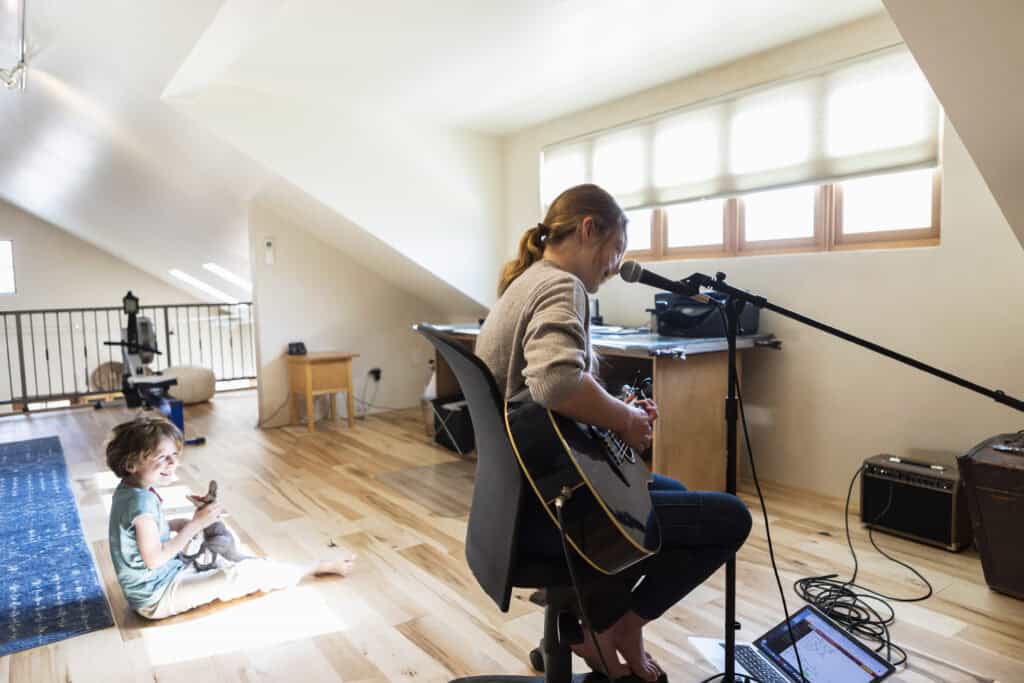When exploring ways to enhance your home’s comfort, you might wonder, does spray foam insulation reduce noise? The answer is a resounding yes! Known for its versatility, spray foam insulation not only boosts energy efficiency but also provides effective noise reduction, making it a popular choice for homeowners and businesses alike. In this article, we’ll dive into how spray foam insulation works to minimize sound, the types of noise it can reduce, and why it’s a smart investment for creating a quieter, more peaceful environment.
Key Takeaways
- Spray foam insulation can help reduce noise but is not the top choice.
- Open-cell spray foam is better for sound deadening than closed-cell options.
- It mainly works by sealing air leaks in homes to reduce noise.
- For good soundproofing, combine foam insulation with other materials like mineral wool.
- Professional installation ensures foam insulation reduces noise effectively, especially in walls.
Understanding Sound Transmission in Homes

Understanding how sound moves through a home is essential when addressing noise reduction. Sound can easily travel through walls, floors, and even ductwork. If you’ve ever asked, “does spray foam insulation reduce noise?” the answer is yes—but with some limitations. While spray foam can help cushion sound transmission, it’s not always the most effective solution, as other materials may offer superior soundproofing.
Open-cell spray foam, in particular, has advantages due to its porous nature, which helps trap sound waves. Think of it as wrapping your home in a soft, insulating layer—though it may not be the thickest sound barrier available. While spray foam insulation is excellent for temperature control, it may not always reduce noise to the levels you desire.
For better soundproofing, combining spray foam with denser materials can significantly enhance results. Homes benefit from layered solutions that absorb sound, turning walls into buffers rather than mere barriers. So, while spray foam insulation can help reduce noise, its primary function is sealing air leaks and improving energy efficiency.
Ultimately, creating a quieter home often requires a mix of strategies. Choosing the right combination will ensure you achieve the peaceful environment you’re looking for.
How Spray Foam Insulation Works
The mechanics of spray foam insulation provide a fascinating glimpse into its role in home improvement. As this material expands to fill crevices, it creates an air barrier that helps with sound deadening. However, when asking, “does spray foam insulation reduce noise?”, the answer is nuanced. While it contributes to noise reduction, its performance isn’t always top-tier. Open-cell spray foam, in particular, is recognized for its sound-dampening properties due to its porous structure.
In many homes, this type of foam insulation can reduce noise, but it often falls short compared to other methods. For walls, its effectiveness is moderate at best and combining it with denser materials might be necessary for those seeking better soundproofing results. Think of it as a supportive player, not the main star, in your quest for a quieter home.
Sound deadening spray, for instance, can enhance the noise reduction achieved. Overall, while spray foam insulation is good for soundproofing in some contexts, it’s just one tool in the toolbox. Understanding how these materials interact can guide you in tailoring your home’s insulation strategy.
Open Cell vs. Closed Cell Spray Foam
The differences between open-cell and closed-cell spray foam present distinct advantages for sound deadening in homes. If you’re wondering, “does spray foam insulation reduce noise?”, the answer depends on the type of foam used. Open-cell spray foam excels in reducing noise due to its porous nature, allowing it to trap sound waves effectively. It’s a solid choice for attic spaces, where controlling noise is often a concern. On the flip side, closed-cell foam offers superior thermal insulation but isn’t as effective for soundproofing.
When you think of deadening spray foam, remember that open-cell is the go-to for sound deadening spray effects. It’s like having a whispering sponge in your walls, soaking up sound. Meanwhile, closed cell is the strong, silent type, focusing on thermal resistance. For those who prioritize noise reduction, combining open-cell foam with other materials might be the key.
In terms of how foam insulation reduce noise, it’s a useful ally but not a lone hero. Adding sound deadening layers or soundproofing techniques can maximize effectiveness. So, while spray foam insulation isn’t the ultimate noise buster, it contributes positively to a more peaceful home environment.
Benefits of Foam Insulation for Noise Reduction
Reducing noise with foam insulation can make a noticeable difference in your home. While it doesn’t silence everything, does spray foam insulation reduce noise by sealing gaps and preventing sound from traveling freely. Consider open-cell spray foam as your sound-absorbing buddy—it’s like having a sound-deadening sponge within your home walls.
But let’s be honest, insulation alone isn’t the hero you might hope for in the noise department. To achieve substantial soundproofing, combining it with other materials like fiberglass can enhance its performance. Think of it as adding layers of silence to your living space.
Wondering if this foam insulation is good for sound reduction? Well, it’s quite effective at muting the chatter of everyday life. But for complete tranquility, consider other soundproofing strategies. So, while foam insulation helps hush the noise, you might still need the help of additional solutions for a genuinely serene home environment.
Comparing Foam Insulation to Other Methods
When asking, “does spray foam insulation reduce noise?” the answer is yes, but with some limitations. Spray foam insulation does reduce noise by sealing gaps and preventing sound from sneaking through, though it may not be as effective as other materials like fiberglass or mineral wool, which offer superior soundproofing due to their denser composition.
But don’t write off foam just yet! Its strength lies in sealing gaps, which can prevent pesky noise from sneaky pathways. Think of it as a trusty sidekick in your soundproofing mission.
Open-cell spray foam is a friendly option for sound absorption, often acting like a gentle sponge for noise. However, if you’re eyeing deadening spray foam for your home, remember that it’s just part of the noise-busting puzzle. Combining it with other methods enhances its power.
For those seeking peace, foam insulation is good but not a solo act. Consider pairing it with dense materials for an optimal hush in your home!
Three Key Factors for Effective Soundproofing

Cracking the code to effective soundproofing, three essentials come to mind: mass, air sealing, and mechanical isolation. When asking does spray foam insulation reduce noise, it plays a role in air sealing, but it’s not the star of the show. Think of it as the trusty sidekick that helps close those sneaky gaps. For the best results, pair it with dense materials like mineral wool or fiberglass.
These materials add the needed mass to block sound. If you’re considering insulation to reduce noise at home, it’s a step in the right direction. Just remember, it’s not the entire solution.
Walls, floors, and ceilings benefit from a combo of techniques. Adding resilient channels creates distance, reducing sound transmission. Open-cell spray foam might absorb some noise, but it won’t keep the rock band next door from serenading you.
In homes, consider the entire structure. Each element plays its part in the symphony of silence. Embrace a mix of solutions for peace and quiet.
Hiring Professionals for Spray Foam Installation
Engaging skilled experts for foam installation can make all the difference when you’re wondering, does spray foam insulation reduce noise? These professionals know the tricks of the trade, ensuring that gaps are sealed tightly, which is especially helpful in walls where sound can easily sneak through. While adding foam insulation can reduce noise, it’s only one part of the solution.
These pros have an eagle eye for detail. They understand that every nook and cranny matters. Their expertise means that insulation performs like a superstar, optimizing both thermal and sound barriers.
When you think about noise reduction, it’s about more than just insulation. Professionals often recommend combining materials. They might suggest augmenting foam with other elements to enhance sound blocking.
All in all, when considering your home’s peace, trust those who know the ropes.
Quiet Comfort Awaits: Trust G & V Spray Foam
In conclusion, if you’ve been wondering, “does spray foam insulation reduce noise?” the answer is a resounding yes. Beyond its impressive soundproofing capabilities, spray foam insulation enhances energy efficiency and adds long-lasting value to your property.
For expert installation and optimal results, look no further than G & V Spray Foam. Our professional team ensures your home or business achieves the peace, comfort, and efficiency you deserve. Contact us today to learn how our spray foam insulation services can transform your space into a quieter, more serene environment.

